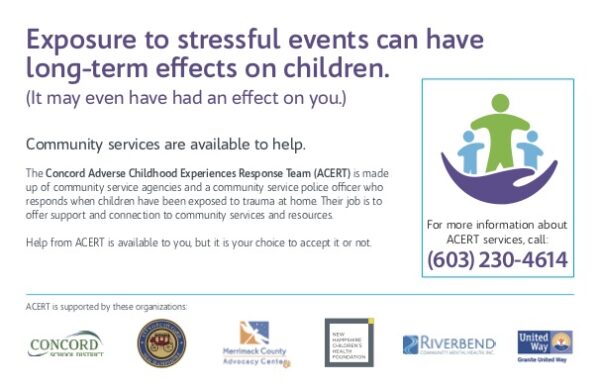School closures and social isolation have adverse effects on children //
A growing body of evidence indicates that children exposed to prolonged and excessive traumatic experiences like abuse or neglect suffer life-long effects.
These stressors, known as Adverse Childhood Experiences, can lead to toxic levels of stress that can derail a child’s healthy development. Over time this toxic stress affects (or rewires) a child’s healthy brain development. This has been found to contribute to poor health or behavioral problems later in life.
According to New Hampshire Children’s Health Foundation board member Dr. Keith Loud, the pandemic itself is “an enormous adverse childhood experience.”

Dr. Loud chairs the department of pediatrics at Dartmouth’s Geisel School of Medicine and serves as physician-in-chief of the Children’s Hospital at Dartmouth-Hitchcock (CHaD).
Loud and other advocates for children are concerned that the combined effects of children being isolated at home in challenging family situations, the loss of normal daily structure, and the additional financial stresses on families due to the pandemic are having an impact on children that won’t be fully apparent until the fall when schools may reopen again and daily life begins to resume some degree of normalcy.
Loud noted there has been a 10% increase in calls to poison control centers during the pandemic because children are at home more. Childhood hunger has surged nationally. Mental health crises and hospital admissions for teens with suicidal ideations are also on the rise.
Children need socialization and interaction with friends and family stated Dr. Loud. Depriving them of it is itself an adverse childhood experience. “It’s the pandemic’s secondary tidal wave,” he said.
Abuse reports are down but danger is up
Since COVID-19 began to ramp up in New Hampshire, and Governor Sununu issued the stay at home order to stem the spread of infection, the state’s Division for Children Youth and Families (DCYF) initially saw a stark decline in the number of reported cases of child abuse and neglect.
Reports were almost immediately down 50% since the March 16 emergency order closing public schools, but to advocates for children this was an ominous warning sign.
“We very quickly saw a drop in the volume of calls coming into DCYF, but we fear for kids being out of sight from settings where mandated reporters observe signs of abuse and neglect,” said Dr. Loud.
Loud noted that while reporting is down, the number of children ending up in emergency departments or getting admitted to hospitals with more severe injuries is up.
“It is clearly a crisis in the making that will become better known as day camps and youth sports open up this summer, but it may not be truly evident until the fall,” Loud added.
Breaking the family trauma cycle
Bethany Cottrell is human services director for Merrimack County. She notes that adverse childhood experiences are typically cyclical in families, meaning that parents often subject their children to the same traumatic behavior they experienced themselves while they were growing up.
One new effort working to break this cycle in Concord is its Adverse Childhood Experience Response Team (ACERT).
The Merrimack County Child Advocacy Center, Concord Police Department, and Riverbend Mental Health along with other human service providers recently formed a coordinated Adverse Childhood Experiences Response Team to connect families and children to community services to help children overcome the effects of the trauma they have experienced.
The Concord project is based on a highly successful model developed and refined in Manchester, which was initially funded by the New Hampshire Children’s Health Foundation. Concord’s ACERT is being supported by a two-year $62,500 grant by Granite United Way.
Many of the families the project works with are, according to Cottrell, “in the system” meaning their households were well known to law enforcement when the parents were children due to repeated domestic violence or drug incidents that involved the police, or reports of child abuse or neglect to DCYF.

According to Concord deputy police chief John Thomas, his department has experienced an increase in calls related to domestic violence during the pandemic. “Tempers are flaring,” said Thomas, although he noted that actual arrests are down.
If children have been present when a Concord police officer has responded to a home for an event like a physical altercation or an overdose, they will explain to a parent (or guardian) that family support assistors can connect their children to community-based services through ACERT.
The officer will then cue the response team to connect in person with the family to gain their trust and to work on their behalf to connect children or other family members with services such as counseling or therapy to help the children overcome the trauma they’ve experienced.
“These families are already dealing with difficult and traumatic situations, which often leads them to feel overwhelmed and unable to reach out for help,” said Bethany Cottrell. “Our goal is to help connect them with the supports and resources available. If we can support the children affected by this early on, they are more likely to grow and become resilient as adults and community members,” she added.
Unfortunately, due to Covid-19 precautions, team members are not deploying to people’s homes for face-to-face visits as they normally do, Thomas said.
Merrimack Country Child Advocacy staff members are following up on police referrals by phone, but not having that personal touch and human interaction to build trust has added more barriers to engaging families in services and reduced the rate at which families have agreed to seek help.
The team’s plan is to follow-up face-to-face “once the world starts to open up,” said Cottrell.
Children need a return to normal
The stay-at-home order, social isolation and lack of a traditional daily routine have a negative impact on children she added. “It’s really important for children’s mental health and their well being, that they get their structure back,” she said. “We need to get back to some normalcy in a safe way.”
CHaD’s Dr. Loud noted that many reports of child abuse come from people outside a child’s home and these situations will come to light once life resumes some normalcy.
“The increase isolation at home means there are more opportunities for abuse. And the stress of job and income loss is also combustible,” Loud noted.
Schools and good early childhood education centers are not just “detectors” of abuse and neglect, Dr. Loud said. He emphasized that they alleviate it.
Loud wrote editorials published in the Union Leader in April and the Concord Monitor in May cautioning state authorities about the risks of extended school closures given the relatively low severity of coronavirus infection among children. He wryly advised that reopening schools should be a state priority – at least as important as the state allowing liquor stores and guns shops to operate during the pandemic.
“Having kids back in their routines helps mitigate adverse childhood experiences,” Dr. Loud stated. “Teachers, counselors, school nurses and others help mitigate ACES all the time. We really need to get kids back into their normal settings.”
